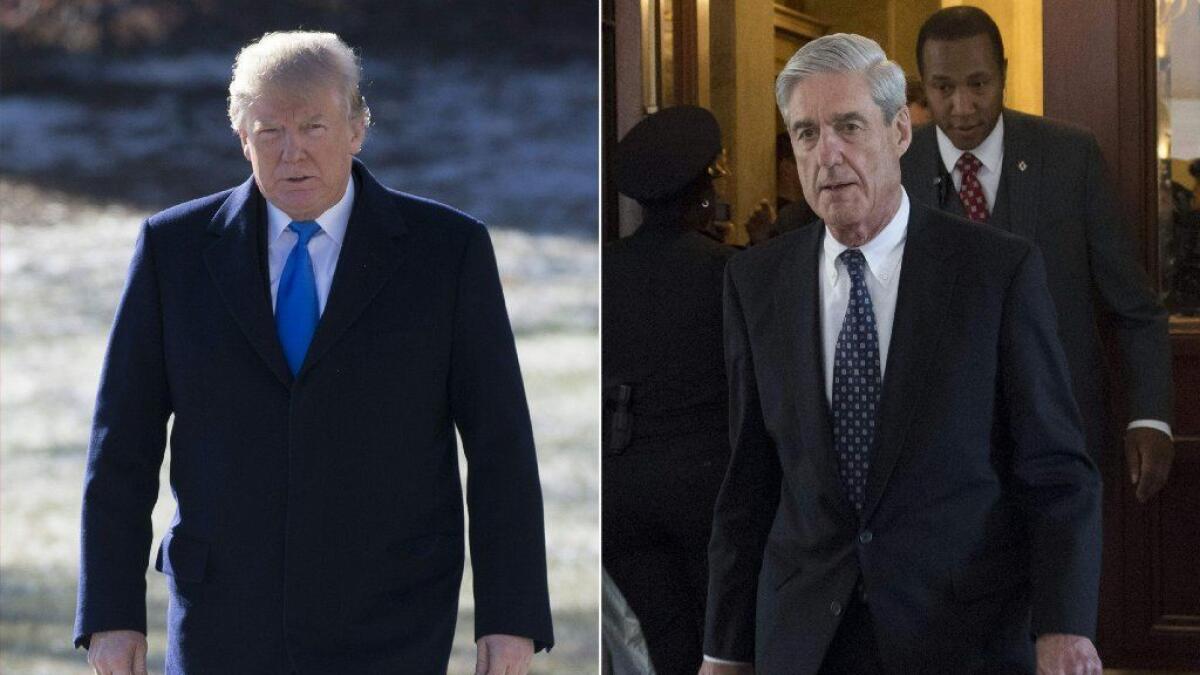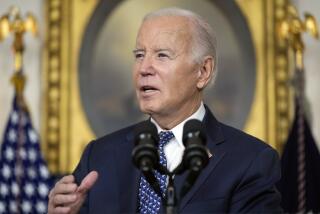End of Mueller probe roils political scene, testing both parties as much remains unknown

The end of the special counsel’s inquiry into the far corners of President Trump’s White House and campaign is poised to upend the political landscape. But with the final report still secret, both parties are left to scramble in the dark to seize political advantage.
Congress is still waiting for Atty. Gen. William Barr to provide it with a summary of the “principal conclusions” from the nearly two-year Russia investigation. After receiving a confidential report from Robert S. Mueller III on Friday, Barr wrote to senior lawmakers that he might brief them this weekend, but by Saturday afternoon Justice Department and congressional aides said Congress would have to wait at least another day.
Meanwhile, Trump’s allies were quick to claim that what little is known — Mueller will file no more indictments — amounts to a political victory, that the president and his family have been vindicated regarding the most serious allegations of colluding with Russia to influence the 2016 campaign.
But Democrats are spotlighting the damage already done to Trump by the Mueller probe, which charged 34 individuals including several of the president’s former top aides. And they are emphasizing the threat to him from ongoing investigations in other state and federal venues, including the Southern District of New York.
The special counsel’s leak-free investigation, which has shadowed Trump for most of his presidency, had spawned unrealistic expectations in both parties. Voters inevitably will be disappointed, said Democratic pollster Peter Hart, if they “expect that somehow this either ends his presidency or rejuvenates his presidency.”
Yet perhaps because of the uncertainty that persists without knowing the investigators’ conclusions, voters didn’t have a single question on the Mueller probe at separate weekend events in New Hampshire held by two Democratic presidential candidates, former Colorado Gov. John Hickenlooper and Minnesota Sen. Amy Klobuchar.
That suited Klobuchar just fine; like other Democrats, she’s mostly sought to avoid the subject of Trump and focus instead on the many kitchen-table issues that, polls show, voters care about more than the Russia investigation.
“No matter what he does, I think that you have to have your own optimistic economic agenda,” Klobuchar told reporters in Rye, N.H. “I’ll answer whatever questions people have, but I’m not going to start out with Donald Trump. We can’t go down every rabbit hole with Donald Trump.”
Yet the issue will be important in the Democratic presidential contest. Candidates for months mostly deferred comment, saying they wanted to wait until Mueller finished. Now that he has, the report poses a fresh test of how much Democrats want to make Trump central to their campaigns.
While they are mostly seeking a broader, positive message, they are under pressure from a left flank hungry to oust Trump.
“I was so disappointed yesterday,’’ said Stephanie Autagavaia, 31, at a Bernie Sanders rally in Los Angeles, about the news that Mueller’s team would have no additional indictments. “But all my eggs weren’t in that basket. There’s other ways that his presidency could end.”
Former Rep. Beto O’Rourke of Texas, speaking to reporters after a South Carolina campaign event Friday night, said he believes there is already public evidence of Trump misdeeds that amounted to collusion with Russia and obstruction of justice.
“I think those are grounds enough for members of the House to bring up the issue of impeachment,” O’Rourke said. “Whether they do or not, this will ultimately be decided by the American public at the ballot box.”
Democrats on Capitol Hill generally are more eager to investigate than to impeach, given both their majority control in the House and the near-certainty that an impeached Trump would be acquitted in the Republican-led Senate.
Many Democrats quickly underscored that even if the report does not provide evidence sufficient to propel impeachment, Trump will remain at risk as investigations continue in Congress and among other federal prosecutors looking into Trump’s businesses, inaugural committee and foundation.
“Whatever is concluded by Robert Mueller doesn’t mean the president and his core team are free of legal jeopardy from these other processes,” said Sen. Chris Coons of Delaware, a Democrat on the Senate Judiciary Committee. “The Congress has a different scope of charge and responsibility.”
House Democrats held a conference call Saturday afternoon to discuss the Mueller report. Party leaders and committee chairs reiterated their commitment to seeing the report released to the public. House Speaker Nancy Pelosi (D-San Francisco) told colleagues she would refuse any classified briefing on the report, insisting that it should all be unclassified so lawmakers could openly talk about it.
In the wake of the report’s filing with the attorney general Friday, Trump remained uncharacteristically silent on the matter, refraining from commenting or posting on his Twitter feed. It was an unusual show of restraint for the president, who was at his Mar-a-Lago estate in Florida and spent Saturday morning playing golf.
But his allies immediately went on the offensive to claim that “no indictments’’ meant a clear victory. In doing so, they were accepting Trump’s own narrow definition of Mueller’s mission — that is, demonstrating whether there was collusion with the Russians — and they ignored that Mueller was not expected to indict the president in any case because Justice Department policy precludes it.
Corey Lewandowski, Trump’s former campaign manager, said in an interview that Trump — “along with the rest of us” — is “happy that this is over and that there is not one indictment coming” related to “the Russia collusion that they were tasked to investigate.”
“By and large,” he added, “it’s a complete vindication of what members of the Trump team already knew, which is that there was no collusion.”
In New York City, a group of demonstrators celebrated near Trump Tower. One sign read “2020 here we come.”
Also taking what could be a premature victory lap was Nikki Haley, Trump’s former United Nations ambassador. She tweeted, “After this long investigation both sides agreed to let Mueller do his job & complete the investigation. Everyone has to acknowledge that @realDonaldTrump did not interfere in the investigation. Now the American public needs to accept the results and move on. #EnoughAlready.”
Yet one longtime confidant said that even Trump knew his legal drama was not over. “No indictments of his kids is obviously a good thing,” the confidant said. “But he knows the Southern District isn’t going away soon. But this was the one that was at the heart of it.”
The Southern District is handling the investigation into hush money paid to two women who alleged affairs with Trump. Michael Cohen, Trump’s former lawyer and fixer, pleaded guilty to campaign finance violations in connection with the payments, and prosecutors said Trump directed the scheme, directly implicating him in a federal crime.
On Saturday, Barr and Deputy Atty. Gen. Rod Rosenstein, who appointed Mueller in May 2017 and supervised his work, were reviewing the findings inside the Justice Department headquarters.
A spokeswoman for Barr described Mueller’s report as “comprehensive” Friday but would not describe it further. It’s unlikely that Barr’s decision to share a summary of the report will satisfy Congress. Leaders from both parties have demanded to see the full picture.
Mueller could be called to testify, and House Democrats have said they could issue subpoenas as well. A spokesman said Mueller, who has not said anything publicly about his findings, will step down as special counsel in the coming days.
While Mueller indicted 25 Russians for their role in Moscow’s covert effort to boost Trump’s candidacy and undermine the electoral process in 2016, no Americans have been charged with conspiring with Russians to influence the election.
Yet Mueller’s charges resulted in guilty pleas or verdicts against some of Trump’s closest associates.
Former campaign Chairman Paul Manafort has been sentenced to 7½ years in prison for financial crimes and conspiracy charges related to an illegal lobbying scheme on behalf of Ukraine’s pro-Russian government. Trump’s first national security advisor, Michael Flynn, pleaded guilty to lying about his conversations with Russia’s ambassador during the presidential transition period.
And Cohen, in addition to the campaign finance violations, confessed to lying to Congress about the Trump Organization’s negotiations to build a luxury skyscraper in Moscow at the same time that Trump was proposing closer ties to Russia while campaigning for the White House.
Times staff writers Eli Stokols in Rye, N.H., Sarah D. Wire and Noah Bierman in Washington, and Melanie Mason in Los Angeles contributed to this report.
More to Read
Get the L.A. Times Politics newsletter
Deeply reported insights into legislation, politics and policy from Sacramento, Washington and beyond. In your inbox three times per week.
You may occasionally receive promotional content from the Los Angeles Times.







